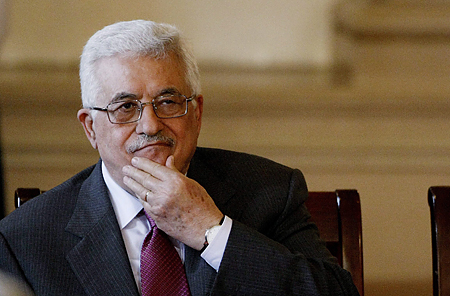
Palestinian President Mahmoud Abbas attends a welcome ceremony at Lievano Palace, Bogota, Colombia on October 10, 2011. (Photo: Leonardo Munoz / EPA)
In the wake of the Palestinian application for full United Nations membership, the game is catch-me-if-you-can. Israel and Washington are painting the UN bid as an effort to achieve the dream of statehood without negotiations. The Palestinians argue that it’s a way to assure future negotiations are meaningful, the previous 18 years of talks without resolution suggesting the need for a new dynamic. But as both sides lobby UN members for support, neither wants to look like it opposes negotiations. So what to do about the latest public invitation to sit down and thrash this whole thing out?
The invite comes from “The Quartet,” the four mediators — Russia, the European Union, the UN and the United States — named to help find a resolution to the conflict way back in 1991, when the idea of negotiating an end to Israel’s occupation of Palestinian territories was still new and fresh. Since then even starting talks has become tangled in a snarl of “preconditions,” things each side says it wants the other to do before talks can resume. The Quartet wants both sides to sit down “without preconditions” and get things moving again, or at least seem to.
(SEE: Photos from inside a West Bank settlement.)
The Israeli government of Prime Minister Benjamin Netanyahu promptly agreed, albeit “with reservations.” That put the ball in the court of Mahmoud Abbas, the Palestinian Authority President who lives to negotiate, but who also reckons this particular call for talks is aimed at de-railing the UN bid.
“If the Israelis accept the statement of The Quartet, I will accept,” he tells TIME, in a hotel suite in Bogota, the Colombian capital city where he has come to lay out the case for statehood. “I will return back to the negotiating table.”
So that’s out there, a positive expression that should prevent Palestinians being dubbed the naysayers. But, however, there’s more. We are in the realm of talks about talks, very soupy terrain, and it happens that the Palestinians have reservations of their own. Abbas says he still must insist that Israel cease building housing for its citizens on Palestinian territory, as the Jewish State has been since conquering the West Bank and Gaza Strip in 1967. The number of Israeli settlements on the West Bank now tops 125, some quite vast, and the total number of residents 400,000, including those in huge tracts built in what was once Arab East Jerusalem. Every government in the world except Israel’s regards settlement construction as illegal, as well as a huge physical obstacle to peace. With that in mind, the Road Map to Peace put forward by the George W. Bush administration actually obliged Israel to cease their construction. That obligation Israel refused. Netanyahu did, however, accommodate a request by President Obama — first raised in his Cairo address to the Muslim world — and imposed a 10-month construction moratorium. The moratorium expired a year ago, and Israel has resumed new building. A bit more than a week ago, it approved 1,100 new units in one Jerusalem neighborhood. Netanyahu says that’s Israel’s right, and Abbas’s demand that construction be once again halted before talks resume is “a precondition.”
Abbas’s answer: “It’s a Road Map obligation, it’s not a precondition.”
“I will not return back to Obama’s speech in Cairo,” he says, “but I will talk about the Road Map. That’s not a precondition.”
Semantics? It has that ring, but from the Palestinian perspective the Israelis have continued to build on — or “colonize” — Palestinian land for the 18 years that negotiations dragged on without producing an agreement that returned control of the territory to Palestinians. “This is the story of the negotiations,” Abbas says.
In any event, he adds, the Palestinians will press on with their bid for UN membership even if talks resume. Says Saeb Erekat, the longtime Palestinian negotiator: “We want negotiations but we want serious negotiations.”
MORE: Israel and Palestine Brace for Clashes: the Post-Peace Process Heats Up.

